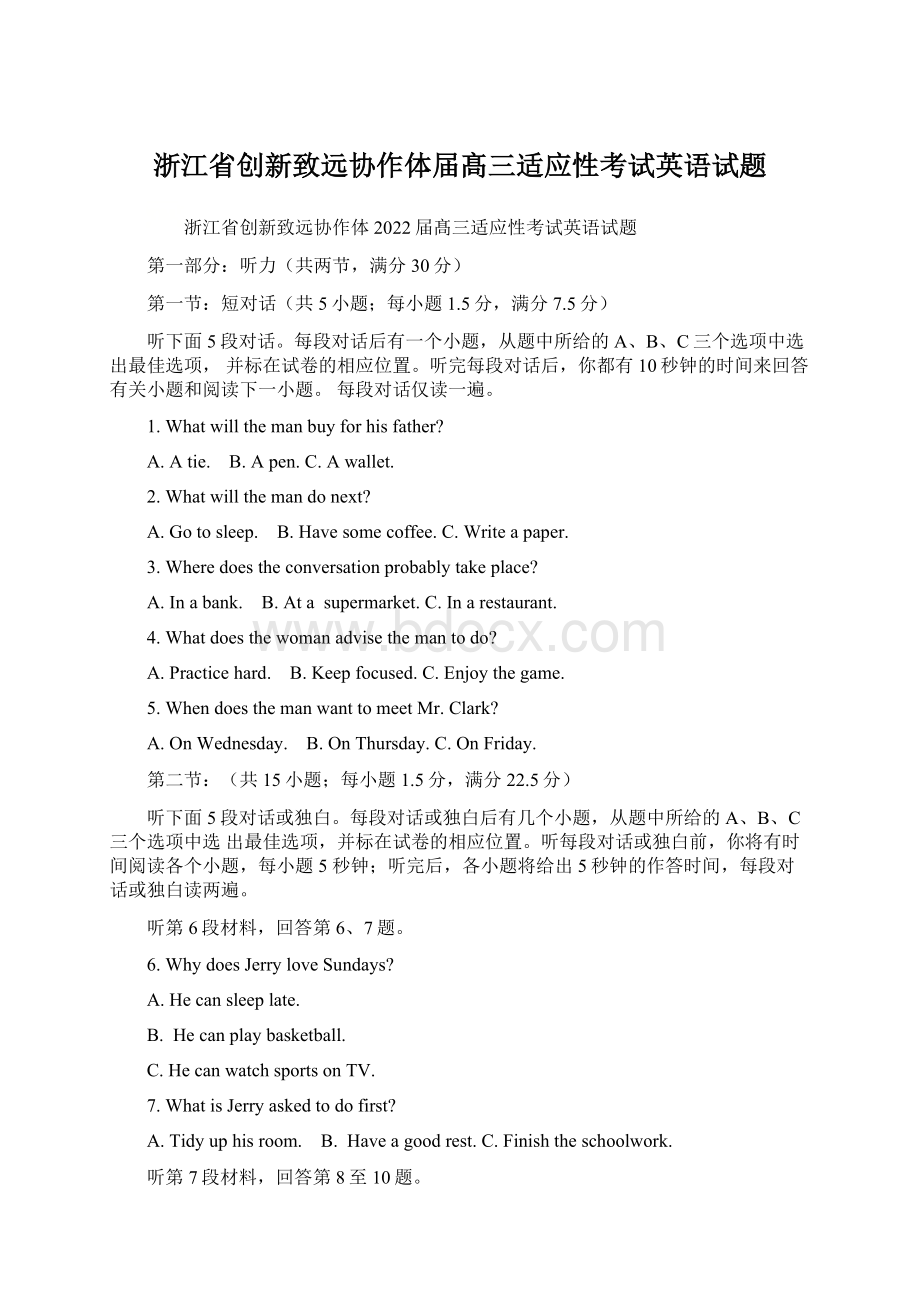浙江省创新致远协作体届髙三适应性考试英语试题.docx
《浙江省创新致远协作体届髙三适应性考试英语试题.docx》由会员分享,可在线阅读,更多相关《浙江省创新致远协作体届髙三适应性考试英语试题.docx(11页珍藏版)》请在冰豆网上搜索。

浙江省创新致远协作体届髙三适应性考试英语试题
浙江省创新致远协作体2022届髙三适应性考试英语试题
第一部分:
听力(共两节,满分30分)
第一节:
短对话(共5小题;每小题1.5分,满分7.5分)
听下面5段对话。
每段对话后有一个小题,从题中所给的A、B、C三个选项中选出最佳选项,并标在试卷的相应位置。
听完每段对话后,你都有10秒钟的时间来回答有关小题和阅读下一小题。
每段对话仅读一遍。
1.Whatwillthemanbuyforhisfather?
A.Atie. B.Apen.C.Awallet.
2.Whatwillthemandonext?
A.Gotosleep. B. Have some coffee.C.Writeapaper.
3.Wheredoestheconversationprobablytakeplace?
A.Inabank. B. At a supermarket.C.Inarestaurant.
4.Whatdoesthewomanadvisethemantodo?
A.Practicehard. B.Keepfocused.C.Enjoythegame.
5.WhendoesthemanwanttomeetMr.Clark?
A.OnWednesday. B. On Thursday.C.OnFriday.
第二节:
(共15小题;每小题1.5分,满分22.5分)
听下面5段对话或独白。
每段对话或独白后有几个小题,从题中所给的A、B、C三个选项中选出最佳选项,并标在试卷的相应位置。
听每段对话或独白前,你将有时间阅读各个小题,每小题5 秒钟;听完后,各小题将给出5秒钟的作答时间,每段对话或独白读两遍。
听第6段材料,回答第6、7题。
6.WhydoesJerryloveSundays?
A.Hecansleeplate.
B. He can play basketball.
C.HecanwatchsportsonTV.
7. WhatisJerryaskedtodofirst?
A.Tidyuphisroom. B. Have a good rest.C.Finishtheschoolwork.
听第7段材料,回答第8至10题。
8.Howdoesthemanusuallyspendhisweekendsnow?
A.Hejogsinthepark.
B.He sleeps a lot.
C.Hegoestoabakeryclass.
9.Whydoesn’tthemanacceptthewoman’ssuggestion?
A.Hedoesn’tlikeherlifestyle.
B.Hedoesn’tlikeeatingapplepies.
CHecan’tgetupfortheclass.
10.Whatistheprobablerelationshipbetweenthespeakers?
A.Motherandson. B. Husbandandwife.C.Teacherandstudent.
听第8段材料,回答第11至13题。
11.WhichisHelen’sfavoriteseasoninBeijing?
A.Spring. B.Summer.C.Autumn.
12.WhereisHelenfrom?
A.Beijing. B.Ottawa.C.Kunming.
13.Whatistheweatherlikeintheman'shometown?
A.It'salwaysrainyinsummer.
B.Itsnowshardinwinter.
C.It’softensunnyinspring.
听第9段材料,回答第14至16题。
14.Whendoestheconversationmostprobablytakeplace?
A.Attheendofaterm. B. Inthemiddleofaterm.C.Atthebeginningofaterm.
15.Whatkindofresearchpaperisrequired?
A.Astudy. B.Areport.C.Abookreview.
16.Whatshouldthestudentsdoduringtheexam?
A.Finishitwithinhalfanhour.
B.Writeaten-pageessay.
C.Answerchoicequestions.
17.Whatdoesthewomandecidetodo?
A,Writeapaper. B.Preparealecture.C.Takeanexamination.
听第10段材料,回答第17至20题。
18.Whichcoursedidthespeakerchoose?
A.Theone-daycourse. B. Thethree-daycourse.C.Theone-weekcourse.
19.Whatsurprisedthespeakerwhenshestartedhercourse?
A.Thecoursewaspopular.
B.Thereweremanyteenagers.
C.Manyteachersweretheretohelp.
20.Whichplacedidthespeakervisit?
A.Arestaurant. B. A market.C.Asupermarket.
第二部分:
阅读理解(共两节,满分35分)
第一节:
(共10个小题:
每小题2.5分,满分25分)
阅读下列短文,从每题所给的四个选项(A、B、C和D)中,选出最佳选项,并在答题卡上将该项涂黑。
A
Atfirst,DorothySorliethoughtshewasjustgettingold,thoughnotasgracefullyasshe'dhoped.RetiredfromteachingEnglishatalocalcollege,Sorlie,then74,beganlosinginterestinthingsshe'd enjoyed,includingreadingandcooking.Shecouldn'tconcentrate.Herhandwritingchanged.The symptomsoccurredsograduallythatinitiallyshewasn’tawareanythingwashappening.
Thingskeptgettingworse.Shestartedworryingthatshemightbedevelopingearlydementia(痴呆).Thephysicalsymptomsprogressedtoo.Mostworrisome,shebeganhavingtroublewalkingandstarted falling.Throughitall,herdoctorsstruggledtoexplainwhatwashappening.
Sheandherhusband,JimUrness,weredesperateforanswers;Itwouldtakeyearsbeforetheygotthem.Thedoctors’diagnoses(诊断),allincorrect,couldaccountforoneortwoofSorlie’ssymptomsbut notallofthem,andnoneofthetreatmentsseemedtohelp.
Thecoupletraveledacrossthecountrylookingforsomeonewhocouldtellthemwhatwaswrong.However,onepossibleexplanationforhersymptomsafteranotherprovedincorrect.Atlast,Sorlie’s primarycaredoctor,KevinWergelandfoundthediseaseresponsibleforallhersymptomswasa little-knownconditioncallednormalpressurehydrocephalus(NPH).Althoughherconditionwasdetectedat anadvancedstate,itwastreatable.
Infact,NPHissometimesreferredtoas“treatabledementia”.Itisaninsidious(潜伏的)andmysteriousdisorderthatcancopymanymorecommonproblemsincludingAlzheimer5sandParkinson's. Anestimated700000peopleintheUnitedStateshaveNPH,althoughifsbelievedthatfewerthan20 percentofthemarecorrectlydiagnosed.
SorlieisnowfreeofNPHsymptoms,andtakingadvantageofhergoodhealthandusingherdramaticrecoverytoinformothersaboutNPH.Shegivespresentationstolocalseniorcentersasavolunteer.“Ifthis awarenesscanhelponepersonavoidwhatmyhusbandandIendured,5, Sorliesays, “thenmyeffortsare worthit.”
21.WhichofthefollowingbestdescribesSorlie’sexperienceofseekingtreatment?
A.Tough. B. Inspiring.